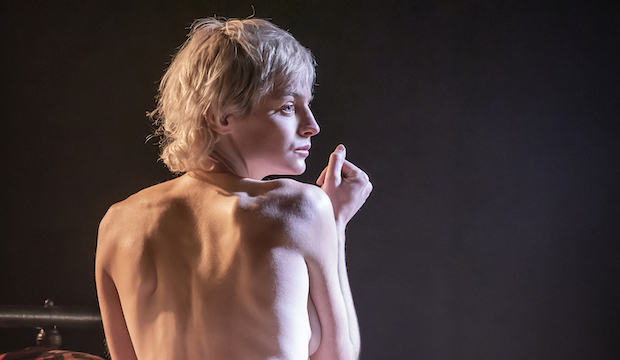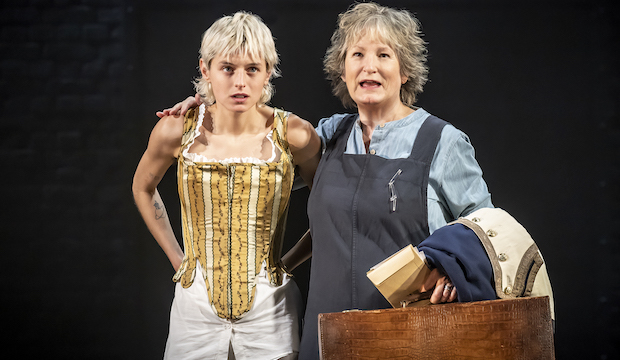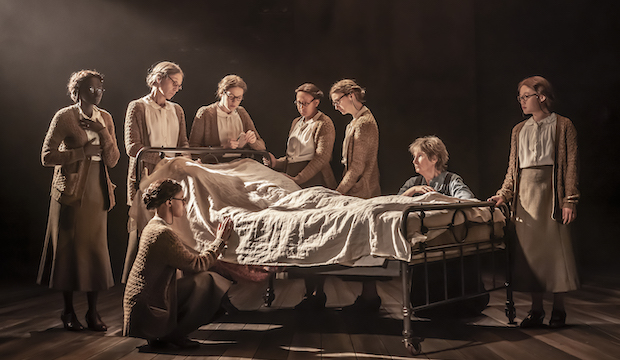Orlando, Garrick Theatre review ★★★★★
Emma Corrin (Orlando). Photo: Marc Brenner
With debates around personal pronouns and LGBTQ+ rights (or lack of) never far from the headlines, it’s prime time for a stage adaptation of Virginia Woolf’s century-old novel Orlando. Inspired by the writer’s own affair with author Vita Sackville-West, it was before its time in portraying a character fluid in both gender and sexuality.
Who better to play the titular trailblazer than Emma Corrin (The Crown, Anna X), the star who in 2021 came out as non-binary and uses the pronouns they/them? Corrin is the spark in writer Neil Bartlett and director Michael Grandage’s production of the story, which is quirky and sprinkled with moments of beauty, but too frequently prioritises whimsy over emotion and struggles to plug the story’s core message.

Emma Corrin (Orlando). Photo: Marc Brenner
The loose-limbed Corrin brings a sprightliness and mystique to the role of the time-travelling aristocrat, who roams the centuries from the 1500s to the 1900s, barely ageing along the way. After a childhood and young adulthood spent as a man, they wake up as a woman in her 30s, travelling on and discovering, dispiritingly, that regardless of the year, women are continuously worse off than men.
There’s a playfulness to Grandage’s direction. In the opening scene, Corrin as the youthful Orlando stretches to reveal the tip of a prosthetic penis. The show is filled with winking asides to the audience, with both Corrin and Deborah Findlay (The Children) – who brings most of the shows laughs as wardrobe mistress Mrs Grimsditch – frequently breaking the fourth wall to narrate the jumps forward in time and provide brief history lessons.

Emma Corrin (Orlando), Deborah Findlay (Mrs Grimsditch). Photo: Marc Brenner
We meet the main players from Woolf’s novel: Queen Elizabeth I (a stiff-lipped Lucy Briers), the Russian princess Sasha (an ice skating Millicent Wong), and Orlando’s seafaring husband Marmaduke (Jodie McNee) among them. Bartlett writes Woolf herself into the narrative, having all bar Corrin and Findlay play the author, dressed identically with buns, spectacles, tweed skirts and blouses. With notebooks in hand, they hover on stage, peering with a curious infatuation at their gender-fluid creation, and later informing her of her limitations as a woman.
Set and costume designer Peter McKintosh (South Pacific) creates moments of intense beauty throughout the production: from a feast that appears and vanishes in a matter of seconds to a pinch of glitter sprinkled as rain and the image of Orlando standing under a starry sky, surrounded by mist during the Great Freeze of 1607. McKintosh's costumes make similarly fleeting appearances but are no less memorable, spanning Jacobean puffs, sailor suits and regal dresses.

The company of Orlando. Photo: Marc Brenner
Society’s black-and-white attitude to gender, which Woolf was keen to highlight with the book, is present in Bartlett’s script. On becoming a woman, Orlando observes: ‘Some people said I must have always been a woman, others that I must still be a man.' It’s also acknowledged that in the 18th century, being a woman or presumed dead made little difference where rights were concerned, while, in the 19th century, the primary function of a woman was to marry and have babies. However, in Bartlett and Grandage’s production, each mention of gender is played primarily for laughs, drowning out the political.
What would Woolf make of our contemporary attitudes to gender? Would she admire how far we’ve come or bemoan how far we’ve yet to travel? We’ll never know, of course, but the present moment feels just right for her androgynous character to resurface.
Who better to play the titular trailblazer than Emma Corrin (The Crown, Anna X), the star who in 2021 came out as non-binary and uses the pronouns they/them? Corrin is the spark in writer Neil Bartlett and director Michael Grandage’s production of the story, which is quirky and sprinkled with moments of beauty, but too frequently prioritises whimsy over emotion and struggles to plug the story’s core message.

Emma Corrin (Orlando). Photo: Marc Brenner
The loose-limbed Corrin brings a sprightliness and mystique to the role of the time-travelling aristocrat, who roams the centuries from the 1500s to the 1900s, barely ageing along the way. After a childhood and young adulthood spent as a man, they wake up as a woman in her 30s, travelling on and discovering, dispiritingly, that regardless of the year, women are continuously worse off than men.
There’s a playfulness to Grandage’s direction. In the opening scene, Corrin as the youthful Orlando stretches to reveal the tip of a prosthetic penis. The show is filled with winking asides to the audience, with both Corrin and Deborah Findlay (The Children) – who brings most of the shows laughs as wardrobe mistress Mrs Grimsditch – frequently breaking the fourth wall to narrate the jumps forward in time and provide brief history lessons.

Emma Corrin (Orlando), Deborah Findlay (Mrs Grimsditch). Photo: Marc Brenner
We meet the main players from Woolf’s novel: Queen Elizabeth I (a stiff-lipped Lucy Briers), the Russian princess Sasha (an ice skating Millicent Wong), and Orlando’s seafaring husband Marmaduke (Jodie McNee) among them. Bartlett writes Woolf herself into the narrative, having all bar Corrin and Findlay play the author, dressed identically with buns, spectacles, tweed skirts and blouses. With notebooks in hand, they hover on stage, peering with a curious infatuation at their gender-fluid creation, and later informing her of her limitations as a woman.
Set and costume designer Peter McKintosh (South Pacific) creates moments of intense beauty throughout the production: from a feast that appears and vanishes in a matter of seconds to a pinch of glitter sprinkled as rain and the image of Orlando standing under a starry sky, surrounded by mist during the Great Freeze of 1607. McKintosh's costumes make similarly fleeting appearances but are no less memorable, spanning Jacobean puffs, sailor suits and regal dresses.

The company of Orlando. Photo: Marc Brenner
Society’s black-and-white attitude to gender, which Woolf was keen to highlight with the book, is present in Bartlett’s script. On becoming a woman, Orlando observes: ‘Some people said I must have always been a woman, others that I must still be a man.' It’s also acknowledged that in the 18th century, being a woman or presumed dead made little difference where rights were concerned, while, in the 19th century, the primary function of a woman was to marry and have babies. However, in Bartlett and Grandage’s production, each mention of gender is played primarily for laughs, drowning out the political.
What would Woolf make of our contemporary attitudes to gender? Would she admire how far we’ve come or bemoan how far we’ve yet to travel? We’ll never know, of course, but the present moment feels just right for her androgynous character to resurface.
TRY CULTURE WHISPER
Receive free tickets & insider tips to unlock the best of London — direct to your inbox
| What | Orlando, Garrick Theatre review |
| Where | Garrick Theatre, 2 Charing Cross Road, London, WC2H 0HH | MAP |
| Nearest tube | Leicester Square (underground) |
| When |
26 Nov 22 – 25 Feb 23, 7:30 PM – 9:00 PM |
| Price | £24+ |
| Website | Click here for more information and to book |